Did Covid PEAK just as ‘the Kraken’ was seeded?
>
Covid hospital admissions have plateaued ahead of another expected wave fuelled by ‘the Kraken’ variant, figures suggest.
NHS stats show virus pressures peaked in mid-December, when XBB-1.5 first started to be detected across Britain, and have been falling ever since. Flu admissions also plunged during the last week of 2022.
Experts hope both drops are genuine, with ailing hospitals currently being battered by a ‘twindemic’ that has sparked calls for a return of pandemic-era restrictions like face masks and mass testing.
But officials admit the downturn could be a blip caused by reporting delays over the Christmas period.
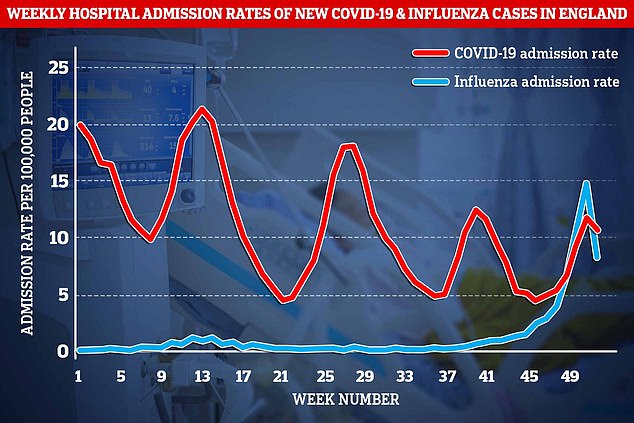
The graph shows the weekly hospital admissions per 100,000 people for Covid (red) and flu (blue). UK Health Security Agency surveillance figures showed Covid admissions feel from 12 to 11 per 100,000 people, while admissions fell to 8 per 100,000 in the week to January 1
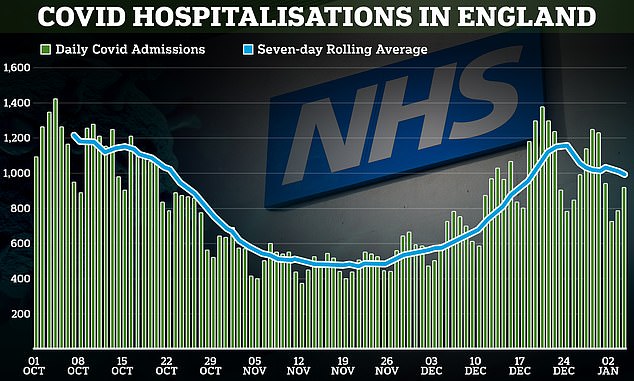

NHS data shows 995 people, on average, infected with Covid were admitted to hospitals across England in the week to January 2. The figures suggest that the number of people seeking NHS care due to the virus, on average, peaked on December 23 (1,154) and has been trending downwards since


The flu-nami has swept across the NHS in England, the latest round of health service data shows, with over 3,800 admissions for the virus on December 23. Graph shows the number of beds on wards taken up by those with flu (red) and the number of beds occupied due to the virus in critical care (blue)
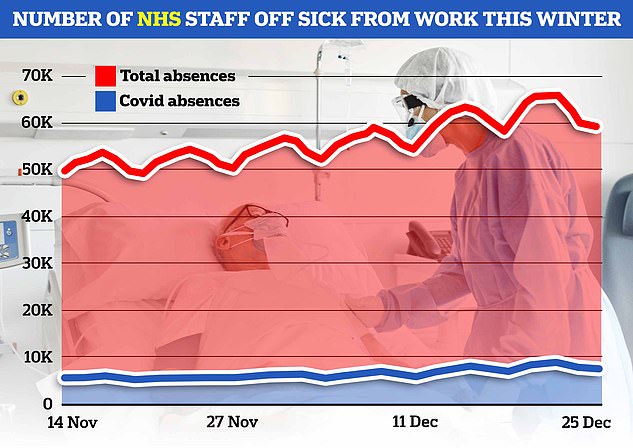

NHS England data today showed that an average of 63,000 staff were off work every day in the week to Christmas (red line). Around 8,000 of the absences were due to Covid (blue line)
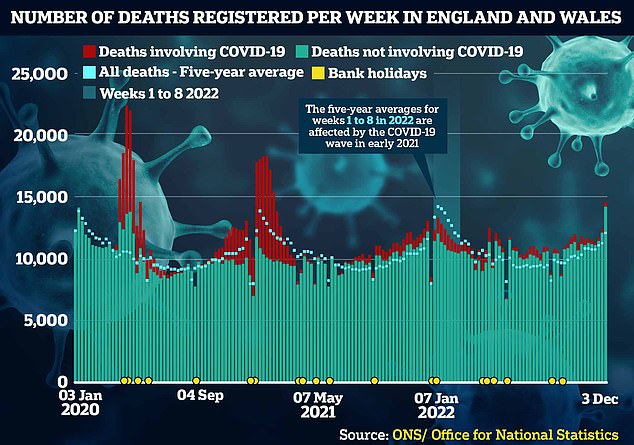

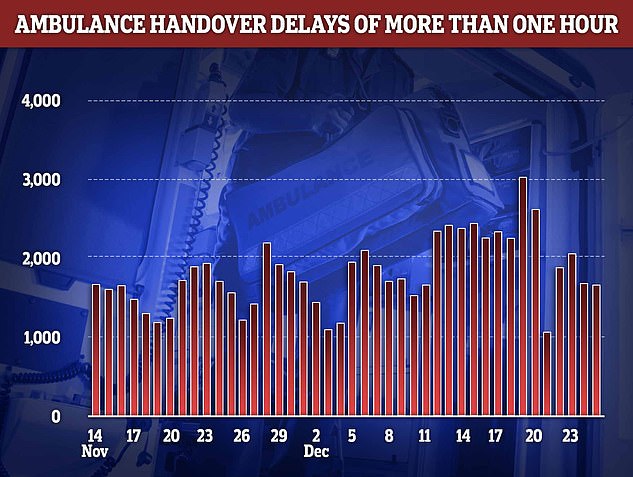

Ambulance handover delays peaked on December 19 with more than 3,000 patients forced to wait over an hour in the back of an emergency vehicle, unable to be offloaded to a hospital bed
The massive strain on the NHS, triggered by staff shortages and record levels of bed-blockers as well as Covid and flu, has led to a surge in excess deaths, analysts fear.
Almost 15,000 people died in England and Wales in the week before Christmas when the pressures across the health service were described as being their most intense. Fatalities were around a fifth higher than typically seen at the time of year before the pandemic.
The Royal College of Emergency Medicine (RCEM) warned the spike in deaths are ‘undoubtedly’ linked to record delays for urgent care.
NHS data shows 995 people, on average, infected with Covid were admitted to hospitals across England in the week to January 2.
The figures suggest that the number of people seeking NHS care due to the virus, on average, peaked on December 23 (1,154) and has been trending downwards since.
The numbers include patients who aren’t actually ill with the virus and incidentally tested positive.
On top of this, weekly UK Health Security Agency (UKHSA) surveillance figures showed Covid admissions feel from 12 to 11 per 100,000 people.
Rates for Covid admissions were highest among the elderly, at 131 per 100,000 for over-85s and 52 per 100,000 for those aged 75 to 84.
Separate UKHSA data, also published today, suggest that influenza admissions have fallen drastically over the festive period.
Hospitalisations for influenza soared to the highest level seen in a decade in the week before Christmas, with 15 admissions per 100,000 people.
But admissions nearly halved in the week to January 1, hitting 8 per 100,000.
Flu hospitalisations continue to be highest among the oldest age groups, at 62 per 100,000 for people aged 85 and over and 32 per 100,000 for 75- to 84-year-olds.
Despite the drop, health chiefs warn that the rate is still running above any point in the previous four winters.
And there can often be a slight reduction in recorded levels of hospital activity over the festive period, which this winter included the weekend of December 24 and 25 followed by bank holidays on both December 26 and 27.
So the latest data might have been affected by some hospitals not returning a full set of figures, together with ‘reporting delays and bank holidays over Christmas and New Year’, the UKHSA said.
But there may also have been a temporary reduction in the transmission of viruses due to ‘reductions in social contact rates over the holiday’, with fewer people travelling and many communal buildings closed, the agency said.
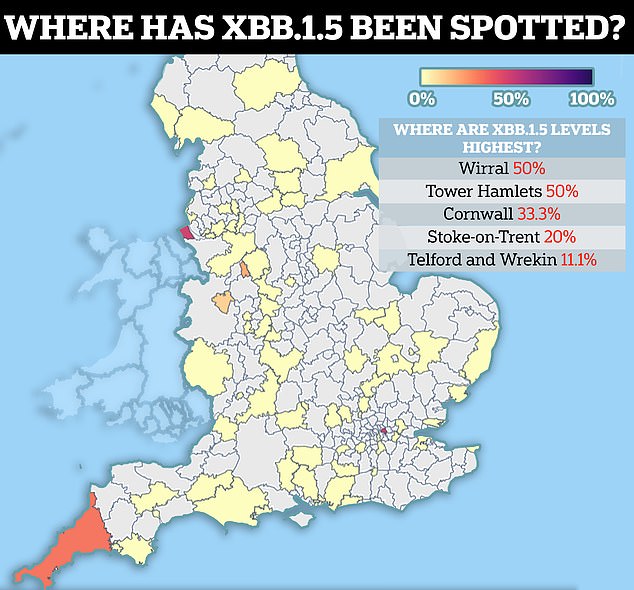

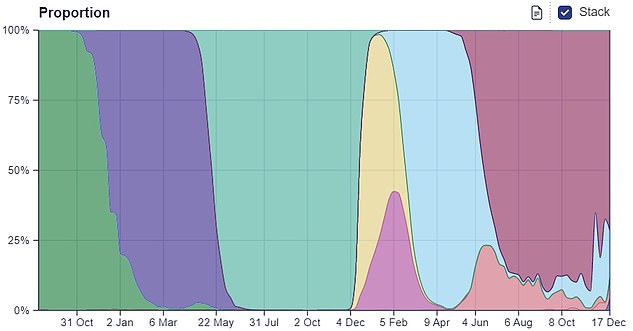

Figures from the Sanger Institute, one of the UK’s largest Covid surveillance centres, shows 4 per cent of cases in the week to December 17 were caused by XBB.1.5 (shown in purple, bottom right corner)
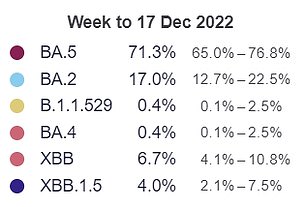

December 17 marked the first time XBB.1.5 was listed on the institute’s virus dashboard, which is updated weekly
Steve Russell, the health service’s director of vaccinations and screening, said the NHS had delivered almost 20million flu jabs to around four in five over-65s.
It means 13million have not come forward for the vaccine.
But flu admissions ‘continue to be very high’ so it ‘remains vital’ that anyone eligible — including pregnant women and children aged two and three — who have not had their flu jab book one as soon as possible.
UKHSA chief executive Dame Jenny Harries said there had been a ‘dramatic increase’ in the number of flu admissions before Christmas, but they have started to fall in recent days.
She said: ‘I urge all those eligible to come forward for their free flu vaccination, which is the best way to protect yourself from serious illness.
‘Uptake of the flu vaccine is particularly low in children aged two and three, so if your child is eligible, please urgently take up the offer.
‘Covid also continues to circulate at high levels and anyone eligible for a booster who has yet to take it up should come forward.’
Dame Jenny added: ‘Try to stay home when unwell and if you do have to go out, wearing a face covering can help prevent germs spreading to other people. Don’t visit vulnerable people if you’re unwell.’
In response to the surge in seasonal viruses and in a plea to reduce pressure on the NHS, health chiefs issued fresh calls for ill Britons to stay off work if they are unwell and wear a mask if they must go outside.
Children who are sick and have a fever should stay home from school, UKHSA bosses said.
Other gloomier experts have gone even further amid record pressures on the NHS an the emergence of Omicron sub-variant XBB.1.5, which has been labelled the most contagious strain yet by World Health Organization officials.
Some scientists urged people to work from home where possible, reduce their social contacts and wear masks in crowded places, even if they are not ill.
But a group of Tory MPs and scientists have dismissed these calls, however. They warned that the NHS’s annual winter crisis can’t be used as an ‘excuse to reintroduce Covid-era restrictions’.
